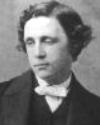 (source)
(source)
|
Lewis Carroll
(27 Jan 1832 - 14 Jan 1898)
English mathematician, logician, novelist and photographer who is famed for his children’s stories, Alice's Adventures in Wonderland (1865) and its sequel. He also wrote a number of mathematics books.
|
Science Quotes by Lewis Carroll (43 quotes)
“And how many hours a day did you do lessons?” said Alice, in a hurry to change the subject.
“Ten hours the first day,” said the Mock Turtle: “nine the next, and so on.”
“What a curious plan!” exclaimed Alice.
“That's the reason they’re called lessons,” the Gryphon remarked: “because they lessen from day to day.”
“Ten hours the first day,” said the Mock Turtle: “nine the next, and so on.”
“What a curious plan!” exclaimed Alice.
“That's the reason they’re called lessons,” the Gryphon remarked: “because they lessen from day to day.”
— Lewis Carroll
Alice's Adventures in Wonderland (1865, 1869), 145.
“Can you do Addition?” the White Queen said. “What's one and one and one and one and one and one and one and one and one and one?”
“I don't know,” said Alice. “I lost count.”
“She can’t do Addition,” the Red Queen interrupted.
“I don't know,” said Alice. “I lost count.”
“She can’t do Addition,” the Red Queen interrupted.
— Lewis Carroll
Through the Looking Glass and What Alice Found There (1871, 1897), 189.
“Contrariwise”, continued Tweedledee, “if it was so, it might be, and if it were so, it would be; but as it isn’t, it ain’t. That’s logic!”
— Lewis Carroll
In Through the Looking Glass: And What Alice Found There (Dec 1871, 1897), 74.
“Crawling at your feet,” said the Gnat … “you may observe a Bread-and-Butterfly. …”
“And what does it live on?”
“Weak tea with cream in it.”
A new difficulty came into Alice's head. “Supposing it couldn't find any?” she suggested.
“Then it would die, of course.”
“But that must happen very often,” Alice remarked thoughtfully.
“It always happens,” said the Gnat.
“And what does it live on?”
“Weak tea with cream in it.”
A new difficulty came into Alice's head. “Supposing it couldn't find any?” she suggested.
“Then it would die, of course.”
“But that must happen very often,” Alice remarked thoughtfully.
“It always happens,” said the Gnat.
— Lewis Carroll
In Through the Looking Glass: And what Alice Found There (1893), 66-67.
“I see nobody on the road,” said Alice.
“I only wish I had such eyes,” the King remarked in a fretful tone. “To be able to see Nobody! And at that distance too! Why, it’s as much as I can do to see real people, by this light.”
“I only wish I had such eyes,” the King remarked in a fretful tone. “To be able to see Nobody! And at that distance too! Why, it’s as much as I can do to see real people, by this light.”
— Lewis Carroll
Through the Looking Glass and What Alice Found There (1871, 1950), 53.
“Of course they answer to their names?” the Gnat remarked carelessly.
“I never knew them to do it,” [said Alice.]
“What’s the use of them having names,” said the Gnat, “if they won’t answer to them?”
“No use to them,” said Alice; “but it’s useful to the people that name them, I suppose.”
“I never knew them to do it,” [said Alice.]
“What’s the use of them having names,” said the Gnat, “if they won’t answer to them?”
“No use to them,” said Alice; “but it’s useful to the people that name them, I suppose.”
— Lewis Carroll
In Through the Looking Glass and What Alice Found There (1871, 1897), 55.
“She can't do sums a bit!” the Queens said together, with great emphasis.
“Can you do sums?” Alice said, turning suddenly on the White Queen, for she didn't like being found fault with so much.
The Queen gasped and shut her eyes. “I can do Addition, if you give me time-but I can do Subtraction, under any circumstances!”
“Can you do sums?” Alice said, turning suddenly on the White Queen, for she didn't like being found fault with so much.
The Queen gasped and shut her eyes. “I can do Addition, if you give me time-but I can do Subtraction, under any circumstances!”
— Lewis Carroll
Through the Looking Glass and What Alice Found There (1871, 1897), 191.
“She can’t do Subtraction.” said the White Queen. “Can you do Division? Divide a loaf by a knife—what's the answer to that?”
“I suppose-” Alice was beginning, but the Red Queen answered for her.
“Bread-and-butter, of course.”
“I suppose-” Alice was beginning, but the Red Queen answered for her.
“Bread-and-butter, of course.”
— Lewis Carroll
Through the Looking Glass and What Alice Found There (1871, 1897), 189-190.
“Take some more tea,” the March Hare said to Alice, very earnestly.
“I’ve had nothing yet,” Alice replied in an offended tone, “so I can't take more.”
“You mean you can’t take less,” said the Hatter; “it’s very easy to take more than nothing.”
“I’ve had nothing yet,” Alice replied in an offended tone, “so I can't take more.”
“You mean you can’t take less,” said the Hatter; “it’s very easy to take more than nothing.”
— Lewis Carroll
From Alice in Wonderland. In Alice’s Adventures in Wonderland And, Through the Looking Glass (1898), 61.
“That’s another thing we’ve learned from your Nation,” said Mein Herr, “map-making. But we’ve carried it much further than you. What do you consider the largest map that would be really useful?”
“About six inches to the mile.”
“Only six inches!” exclaimed Mein Herr. “We very soon got to six yards to the mile. Then we tried a hundred yards to the mile. And then came the grandest idea of all! We actually made a map of the country, on the scale of a mile to the mile!”
“Have you used it much?” I enquired.
“It has never been spread out, yet,” said Mein Herr: “the farmers objected: they said it would cover the whole country, and shut out the sunlight! So we now use the country itself, as its own map, and I assure you it does nearly as well.”
“About six inches to the mile.”
“Only six inches!” exclaimed Mein Herr. “We very soon got to six yards to the mile. Then we tried a hundred yards to the mile. And then came the grandest idea of all! We actually made a map of the country, on the scale of a mile to the mile!”
“Have you used it much?” I enquired.
“It has never been spread out, yet,” said Mein Herr: “the farmers objected: they said it would cover the whole country, and shut out the sunlight! So we now use the country itself, as its own map, and I assure you it does nearly as well.”
— Lewis Carroll
From Sylvie and Bruno Concluded (1893), 169.
“The time has come,” the Walrus said,
“To talk of many things”…
— Lewis Carroll
In Through the Looking Glass and What Alice Found There (1871, 1897), 80.
“Thinking again?” the Duchess asked, with another dig of her sharp little chin. “I’ve a right to think,” said Alice sharply, for she was beginning to feel a little worried. “Just about as much right,” said the Duchess, “as pigs have to fly.”
— Lewis Carroll
Alice’s Adventures in Wonderland (1865)
“Try another Subtraction sum. Take a bone from a dog: what remains?” [asked the Red Queen]
Alice considered. “The bone wouldn't remain, of course, if I took it—and the dog wouldn’t remain; it would come to bite me—and I’m sure I shouldn’t remain!”
“Then you think nothing would remain?” said the Red Queen.
“I think that’s the answer.”
“Wrong, as usual,” said the Red Queen, “the dog's temper would remain.”
Alice considered. “The bone wouldn't remain, of course, if I took it—and the dog wouldn’t remain; it would come to bite me—and I’m sure I shouldn’t remain!”
“Then you think nothing would remain?” said the Red Queen.
“I think that’s the answer.”
“Wrong, as usual,” said the Red Queen, “the dog's temper would remain.”
— Lewis Carroll
Through the Looking Glass and What Alice Found There (1871, 1897), 190-191.
“What a curious feeling!” said Alice, “I must be shutting up like a telescope.”
— Lewis Carroll
From Chapter 1, Alice in Wonderland (1869), 11.
“When I use a word,” Humpty Dumpty said, in rather a scornful tone, “it means just what I choose it to mean—neither more nor less.”
“The question is,” said Alice, “whether you can make words mean so many different things.”
“The question is,” said Humpty Dumpty, “which is to be master—that's all.”
“The question is,” said Alice, “whether you can make words mean so many different things.”
“The question is,” said Humpty Dumpty, “which is to be master—that's all.”
— Lewis Carroll
Through the Looking Glass and What Alice Found There (1871, 1897), 124.
“Why,” said the Dodo, “the best way to explain it is to do it.”
— Lewis Carroll
Alice's Adventures in Wonderland (1865, 1869), 33.
“Would you tell me please, which way I ought to go from here?”
“That depends a good deal on where you want to get to,” said the Cat.
“I don’t much care where … ,” said Alice.
“Then it doesn’t matter which way you go,” said the Cat.
“So long as I get somewhere,” Alice added as an explanation. “Oh, you’re sure to do that,” said the Cat, “if only you walk long enough.”
“That depends a good deal on where you want to get to,” said the Cat.
“I don’t much care where … ,” said Alice.
“Then it doesn’t matter which way you go,” said the Cat.
“So long as I get somewhere,” Alice added as an explanation. “Oh, you’re sure to do that,” said the Cat, “if only you walk long enough.”
— Lewis Carroll
In Alice’s Adventures in Wonderland (1865, 1869), 89.
[Alice asks the Cheshire Cat] Would you tell me, please, which way I ought to walk from here?
“That depends a good deal on where you want to get to,” said the Cat.
“I don’t much care where———” said Alice.
“Then it doesn’t matter which way you walk,” said the Cat.
“That depends a good deal on where you want to get to,” said the Cat.
“I don’t much care where———” said Alice.
“Then it doesn’t matter which way you walk,” said the Cat.
— Lewis Carroll
In Alice's Adventures in Wonderland (1866), 36.
Here, you see, it takes all the running you can do, to keep in the same place. If you want to get somewhere else, you must run at least twice as fast as that!
— Lewis Carroll
Said by the fictional Red Queen character, in Through the Looking Glass and What Alice Found There (1872, 1896), 36.
Alice laughed: “There’s no use trying,” she said; “one can’t believe impossible things.” “I daresay you haven’t had much practice,” said the Queen. “When I was younger, I always did it for half an hour a day. Why, sometimes I’ve believed as many as six impossible things before breakfast.”
— Lewis Carroll
In Through the Looking-glass: And what Alice Found There (1875), 100.
Beautiful soup!
Who cares for fish
Game, or any other dish?
Who would not give all else for two
Pennyworth only of beautiful soup?
Who cares for fish
Game, or any other dish?
Who would not give all else for two
Pennyworth only of beautiful soup?
— Lewis Carroll
But neither thirty years, nor thirty centuries, affect the clearness, or the charm, of Geometrical truths. Such a theorem as “the square of the hypotenuse of a right-angled triangle is equal to the sum of the squares of the sides” is as dazzlingly beautiful now as it was in the day when Pythagoras first discovered it, and celebrated its advent, it is said, by sacrificing a hecatomb of oxen—a method of doing honour to Science that has always seemed to me slightly exaggerated and uncalled-for. One can imagine oneself, even in these degenerate days, marking the epoch of some brilliant scientific discovery by inviting a convivial friend or two, to join one in a beefsteak and a bottle of wine. But a hecatomb of oxen! It would produce a quite inconvenient supply of beef.
— Lewis Carroll
Written without pseudonym as Charles L. Dodgson, in Introduction to A New Theory of Parallels (1888, 1890), xvi. Note: a hecatomb is a great public sacrifice, originally of a hundred oxen.
Dr. Paget was conducting a school examination, and in the course of his questions he happened to ask a small child the meaning of “Average.” He was utterly bewildered by the reply, “The thing that hens lay on,” until the child explained that he had read in a book that hens lay on an average so many eggs a year.
— Lewis Carroll
Anecdote jotted down by Lewis Carroll to possibly send to the magazine Punch, as given in Stuart Dodgson Collingwood, The Life and Letters of Lewis Carroll (1898), 157.
He thought he saw an Argument
That proved he was the Pope:
He looked again and found it was
A Bar of Mottled Soap.
“A fact so dread.” he faintly said,
“Extinguishes all hope!”
That proved he was the Pope:
He looked again and found it was
A Bar of Mottled Soap.
“A fact so dread.” he faintly said,
“Extinguishes all hope!”
— Lewis Carroll
In Sylvie and Bruno Concluded (1893), 319.
If you don’t know where you are going, any road will get you there.
— Lewis Carroll
Paraphrase of a longer quote, an exchange between Alice and the Cheshire Cat, beginning “Would you tell me, please, which way I ought to go from here?” on the Lewis Carroll Quotes page of this website. Paraphrased quote as in Kim Lim (ed.), 1,001 Pearls of Spiritual Wisdom: Words to Enrich, Inspire, and Guide Your Life (2014), 246. Also paraphrased in the refrain, “If you don’t know where you’re going, any road’ll take you there,” to the song Any Road (1988) by George Harrison.
It may well be doubted whether, in all the range of science, there is any field so fascinating to the explorer—so rich in hidden treasures—so fruitful in delightful surprises—as that of Pure Mathematics. The charm lies chiefly, I think, in the absolute certainty of its results; for that is what, beyond all mental treasures, the human intellect craves for. Let us only be sure of something! More light, more light!
— Lewis Carroll
Written without pseudonym as Charles L. Dodgson. Opening remarks in Introduction to A New Theory of Parallels (1888, 1890), xv.
It may well be doubted whether, in all the range of Science, there is any field so fascinating to the explorer—so rich in hidden treasures—so fruitful in delightful surprises—as that of Pure Mathematics. The charm lies chiefly, I think, in the absolute certainty of its results: for that is what, beyond all mental treasures, the human intellect craves for. Let us only be sure of something! More light, more light … “And if our fate be death, give light and let us die” This is the cry that, through all the ages, is going up from perplexed Humanity, and Science has little else to offer, that will really meet the demands of its votaries, than the conclusions of Pure Mathematics.
— Lewis Carroll
Opening of 'Introduction', A New Theory of Parallels (1890), xv. As a non-fiction work, the author’s name on the title page of this book was Charles Lutwidge Dodgson. Being better known for his works of fiction as Lewis Carroll, all quotes relating to this one person, published under either name, are gathered on this single web page under his pen name.
It’s very good jam, said the Queen.
“Well, I don’t want any to-day, at any rate.”
“You couldn’t have it if you did want it,” the Queen said.
“The rule is jam tomorrow and jam yesterday but never jam to-day.”
“It must come sometimes to “jam to-day,” Alice objected.
“No it can’t,” said the Queen.
“It’s jam every other day; to-day isn’t any other day, you know.”
“I don’t understand you,” said Alice. “It’s dreadfully confusing.”
“Well, I don’t want any to-day, at any rate.”
“You couldn’t have it if you did want it,” the Queen said.
“The rule is jam tomorrow and jam yesterday but never jam to-day.”
“It must come sometimes to “jam to-day,” Alice objected.
“No it can’t,” said the Queen.
“It’s jam every other day; to-day isn’t any other day, you know.”
“I don’t understand you,” said Alice. “It’s dreadfully confusing.”
— Lewis Carroll
From Through the Looking Glass. In Alice’s Adventures in Wonderland And, Through the Looking Glass (1898), 149.
Let U = the University, G = Greek, and P = Professor, Then GP = Greek Professor; let this be reduced to its lowest terms and call the result J.
— Lewis Carroll
From an essay concerning the Regius Professorship of Greek, The New Method of Evaluating as Applied to π (1865), as quoted and cited in Stuart Dodgson Collingwood, The Life and Letters of Lewis Carroll (1898), 159. Collingwood explains parenthetically, after "result J", “[i.e., Jowett]”, which was not in the original publication of “The New Method…”.
Little Birds are writing
Interesting books.
To be read by cooks:
Read, I say, not roasted—
Letterpress, when toasted,
Loses its good looks.
Interesting books.
To be read by cooks:
Read, I say, not roasted—
Letterpress, when toasted,
Loses its good looks.
— Lewis Carroll
In Sylvie and Bruno Concluded (1893), 371.
Mathematical research, with all its wealth of hidden treasure, is all too apt to yield nothing to our research: for it is haunted by certain ignes fatui—delusive phantoms, that float before us, and seem so fair, and are all but in our grasp, so nearly that it never seems to need more than one step further, and the prize shall be ours! Alas for him who has been turned aside from real research by one of these spectres—who has found a music in its mocking laughter—and who wastes his life and energy on the desperate chase!
— Lewis Carroll
Written without pseudonym as Charles L. Dodgson, in Introduction to A New Theory of Parallels (1888, 1890), xvi. Note: Ignes fatui, the plural of ignes fatuus (foolish fire), refers to a will-o'-the-wisp: something deceptive or deluding.
My view of life is that it’s next to impossible to convince anybody of anything.
— Lewis Carroll
(20 Feb 1890). Quoted in Stuart Dodgson Collingwood, The Life and Letters of Lewis Carroll (1898), 291.
Never leave an unsolved difficulty behind. I mean, don’t go any further in that book till the difficulty is conquered. In this point, Mathematics differs entirely from most other subjects. Suppose you are reading an Italian book, and come to a hopelessly obscure sentence—don’t waste too much time on it, skip it, and go on; you will do very well without it. But if you skip a mathematical difficulty, it is sure to crop up again: you will find some other proof depending on it, and you will only get deeper and deeper into the mud.
— Lewis Carroll
From letter to Edith Rix with hints for studying (about Mar 1885), in Stuart Dodgson Collingwood, The Life and Letters of Lewis Carroll (1898), 241.
One of the hardest things in the world is to convey a meaning accurately from one mind to another.
— Lewis Carroll
Letter to Miss Dora Abdy (1896). Quoted in Stuart Dodgson Collingwood, The Life and Letters of Lewis Carroll (1898), 331.
Only go on working so long as the brain is quite clear. The moment you feel the ideas getting confused leave off and rest, or your penalty will be that you will never learn Mathematics at all!
— Lewis Carroll
From letter to Edith Rix with hints for studying (about Mar 1885), in Stuart Dodgson Collingwood, The Life and Letters of Lewis Carroll (1898), 241.
The different branches of Arithmetic—Ambition, Distraction, Uglification, and Derision.
— Lewis Carroll
From Alice in Wonderland. In Alice’s Adventures in Wonderland And, Through the Looking Glass (1898), 79.
The Walrus and the Carpenter
Were walking close at hand:
They wept like anything to see
Such quantities of sand:
“If this were only cleared away,”
They said,“it would be grand!”
Were walking close at hand:
They wept like anything to see
Such quantities of sand:
“If this were only cleared away,”
They said,“it would be grand!”
— Lewis Carroll
In Through the Looking Glass and What Alice Found There (1872, 1896), 62.
Then you should say what you mean, the March Hare went on.
I do, Alice hastily replied; “at least I mean what I say, that’s the same thing, you know.”
Not the same thing a bit! said the Hatter. “Why, you might just as well say that “I see what I eat” is the same thing as “I eat what I see!”
I do, Alice hastily replied; “at least I mean what I say, that’s the same thing, you know.”
Not the same thing a bit! said the Hatter. “Why, you might just as well say that “I see what I eat” is the same thing as “I eat what I see!”
— Lewis Carroll
From Alice in Wonderland. In Alice’s Adventures in Wonderland And, Through the Looking Glass (1898), 57.
What I tell you three times is true.
— Lewis Carroll
The Hunting of the Snark: An Agony, in Eight Fits (1876), 3.
Whatsoever thy hand findeth to do, do it with all thy might.
— Lewis Carroll
Quoted as Carroll’s “rule of life” in Stuart Dodgson Collingwood, The Life and Letters of Lewis Carroll (1898), 292.
When I was reading Mathematics for University honours, I would sometimes, after working a week or two at some new book, and mastering ten or twenty pages, get into a hopeless muddle, and find it just as bad the next morning. My rule was to begin the book again. And perhaps in another fortnight I had come to the old difficulty with impetus enough to get over it. Or perhaps not. I have several books that I have begun over and over again.
— Lewis Carroll
From letter to Edith Rix with hints for studying (about Mar 1885), in Stuart Dodgson Collingwood, The Life and Letters of Lewis Carroll (1898), 240-241.
When you have made a thorough and reasonably long effort, to understand a thing, and still feel puzzled by it, stop, you will only hurt yourself by going on. Put it aside till the next morning; and if then you can’t make it out, and have no one to explain it to you, put it aside entirely, and go back to that part of the subject which you do understand.
— Lewis Carroll
From letter to Edith Rix with hints for studying (about Mar 1885), in Stuart Dodgson Collingwood, The Life and Letters of Lewis Carroll (1898), 240.
You boil it in sawdust: you salt it in glue:
You condense it with locusts and tape:
Still keeping one principal object in view—
To preserve its symmetrical shape.
You condense it with locusts and tape:
Still keeping one principal object in view—
To preserve its symmetrical shape.
— Lewis Carroll
In 'The Beaver’s Lesson', The Hunting of the Snark: An Agony in Eight Fits (1876), 56.
Quotes by others about Lewis Carroll (5)
The Astonishing Hypothesis is that “You,” your joys and your sorrows, your memories and your ambitions, your sense of identity and free will, are in fact no more than the behaviour of a vast assembly of nerve cells and their associated molecules. As Lewis Carroll’s Alice might have phrased it: “You’re nothing but a pack of neurons.”
In 'Introduction', The Astonishing Hypothesis: The Scientific Search for Soul (1994), 3.
Although Lewis Carroll thought of The Hunting of the Snark as a nonsense ballad for children, it is hard to imagine—in fact one shudders to imagine—a child of today reading and enjoying it.
In 'Introduction', The Annotated Snark (1962), 11.
It is sages and grey-haired philosophers who ought to sit up all night reading Alice in Wonderland in order to study that darkest problem of metaphysics, the borderland between reason and unreason, and the nature of the most erratic of spiritual forces, humour, which eternally dances between the two. That we do find a pleasure in certain long and elaborate stories, in certain complicated and curious forms of diction, which have no intelligible meaning whatever, is not a subject for children to play with; it is a subject for psychologists to go mad over.
In 'The Library of the Nursery', in Lunacy and Letters (1958), 26.
It is not children who ought to read the words of Lewis Carroll; they are far better employed making mud-pies.
In 'The Library of the Nursery', in Lunacy and Letters (1958), 26.
The Annotated Alice, of course, does tie in with math, because Lewis Carroll was, as you know, a professional mathematician. So it wasn’t really too far afield from recreational math, because the two books are filled with all kinds of mathematical jokes. I was lucky there in that I really didn’t have anything new to say in The Annotated Alice because I just looked over the literature and pulled together everything in the form of footnotes. But it was a lucky idea because that’s been the best seller of all my books.
In Anthony Barcellos, 'A Conversation with Martin Gardner', The Two-Year College Mathematics Journal (Sep 1979), 10, No. 4, 241.
See also:
- 27 Jan - short biography, births, deaths and events on date of Carroll's birth.
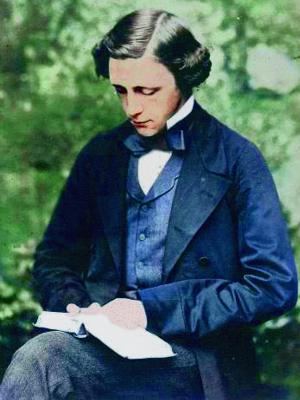
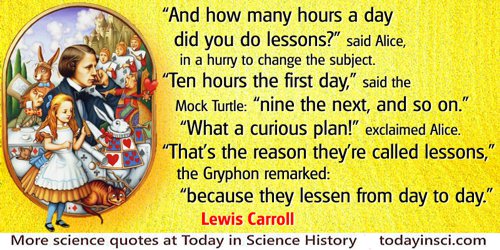
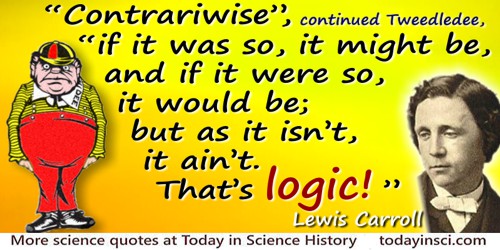
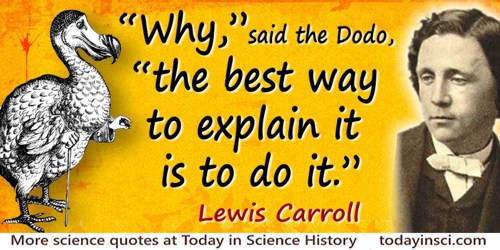
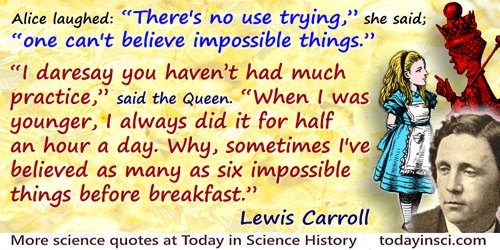
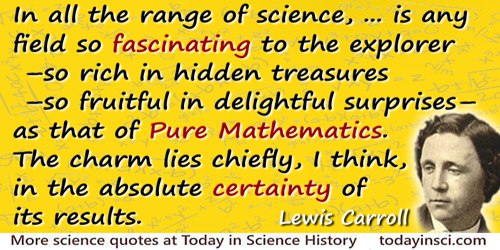
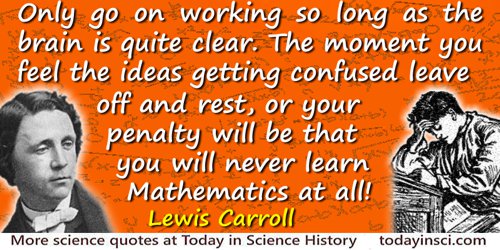
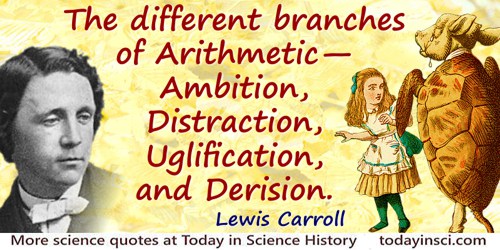
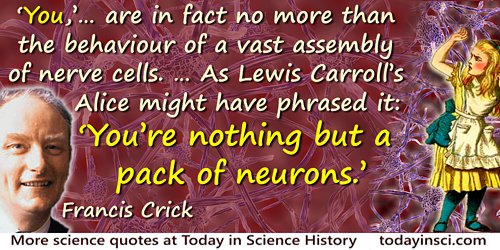
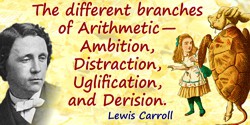
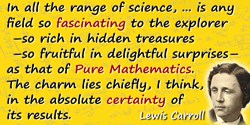
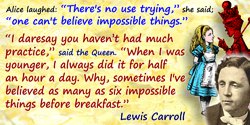
 In science it often happens that scientists say, 'You know that's a really good argument; my position is mistaken,' and then they would actually change their minds and you never hear that old view from them again. They really do it. It doesn't happen as often as it should, because scientists are human and change is sometimes painful. But it happens every day. I cannot recall the last time something like that happened in politics or religion.
(1987) --
In science it often happens that scientists say, 'You know that's a really good argument; my position is mistaken,' and then they would actually change their minds and you never hear that old view from them again. They really do it. It doesn't happen as often as it should, because scientists are human and change is sometimes painful. But it happens every day. I cannot recall the last time something like that happened in politics or religion.
(1987) -- 


